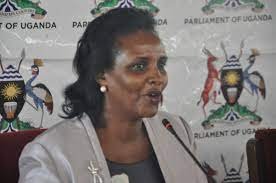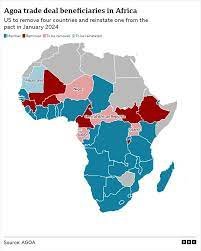Uganda criticized the United States for removing itself and other African nations from a tariff-free trade program, claiming that the move was intended to penalize African nations who are opposing the imposition of Western cultural ideals.
On Monday, U.S. President Joe Biden announced his intention to terminate the African Growth and Opportunity Act (AGOA) trade initiative, which includes Uganda, Gabon, Niger, and the Central African Republic.
It happens several months after the nation passed the controversial Anti-Homosexuality Act, which punishes “aggravated homosexuality” with the death penalty.
The initiative provides sub-Saharan African nations that satisfy democratic standards, which are evaluated annually, duty-free entry into the greatest economy in the world.
In a letter to Congress, however, US President Joe Biden said that both the CAR (Central African Republic) and Ugandan governments had “engaged in gross violations of internationally recognized human rights.”
The President Yoweri Museveni however, urged Ugandans “not to be over-concerned”.
Fellow Ugandans and, especially, the Bazzukulu. Greetings.
I need to advise you not to be over-concerned by the recent actions by the American Government in discouraging their companies from investing in Uganda and on removing Uganda from the AGOA list.
Some of these actors in…
— Yoweri K Museveni (@KagutaMuseveni) November 5, 2023
“Some of these actors in the Western world overestimate themselves and underestimate the freedom fighters of Africa,” he said on X, formerly Twitter.
Uganda’s new law
The Anti-Homosexuality Bill was modified by parliament before being passed into law by President Yoweri Museveni. It remains one of the world’s strictest anti-LGBTQ laws.

In Uganda, homosexual behavior is already prohibited, but those found guilty are being sentenced to life in jail. For “aggravated cases,” which include having gay intercourse with someone under the age of eighteen or when someone is sick with a chronic illness like HIV, the law stipulates the death penalty.
The constitutional court of Uganda repealed the same measure in 2014.
According to Reuters news agency, Ugandan rights activist Clare Byarugaba declared that today was a “very dark and sad day” for the LGBTQ+ community as well as for all Ugandans.
“The Ugandan president has today legalized state-sponsored homophobia and transphobia,” said the campaigner.
In her speech, Speaker of the House Anita Among praised Mr. Museveni for his decision to sign the bill into law, stating that it will “protect the sanctity of the family”.
She said, “We have stood strong to defend the culture, values, and aspirations of our people,” in a statement that was shared on Twitter.
Uganda has long been supported by the US, UNAids, and The Global Fund in its efforts to reduce the HIV/AIDS epidemic. According to their statement, by 2021, 89% of Ugandans living with HIV were aware of their status, over 92% were receiving antiretroviral therapy, and 95% of those receiving treatment had viral suppression.
“Together as one, we call for the Act to be reconsidered so that Uganda may continue on its path to ensure equitable access to health services and end Aids as a public health threat by 2030,” the statement continued.

President Yoweri Museveni went on in his remarks on Sunday, saying, “As far as Uganda is concerned, we have the capacity to achieve our growth and transformation targets, even if some of the actors do not support us.”
Odrek Rwabwogo, his son-in-law and key assistant, had already issued a warning that the expulsion would severely harm Ugandan farmers and small business owners.
The ban from AGOA is expected to go into effect at the beginning of the following year.
The US State Department issued a warning last month about the risks of doing business in Uganda, and the World Bank declared in August that it would no longer be making fresh loans to the country in response to the anti-homosexuality bill. The World Bank, according to Mr. Museveni, is trying to “coerce” the government to eradicate the newly formed law.
How will the expulsion effect Uganda?
For Ugandan companies attempting to conduct business with the United States, the suspension has changed the calculation.
“Instead of growing and expanding, exporters are now forced to look for other markets to replace the U.S. for their products,” Jane Nalunga, executive director of trade association Seatini-Uganda, told Semafor Africa.
Uganda increased its exports to the United States from $82 million in 2021 to $174 million in 2022.
After Uganda passed its anti-homosexuality laws in May, the United States and international financial institutions struck the country another blow with the revocation of its AGOA designation.
Due to the law, the World Bank stopped issuing new loans to Uganda in August. Earlier in October, the United States warned corporations operating in Uganda of potential financial and reputational risks, including as corruption and human rights violations. These elements working together can begin to damage its economy.

While attending the AGOA conference, which opened in Johannesburg today, Susan Muhwezi, the nation’s Senior Presidential Advisor on the agreement, told Uganda’s Daily Monitor newspaper that the nation would be pushing the American government in an attempt to reclaim its duty-free access.
While losing AGOA status would be “detrimental” to some Ugandan exporters, Nalunga of Seatini-Uganda told Semafor Africa that the impact on the nation’s economy would be negligible because Uganda had not fully seized the chance provided by AGOA to significantly increase its exports to the United States. “We hadn’t reached our full potential,” she clarified.
It will be increasingly crucial to maintain US support for initiatives in the fields of health, security, and education. Uganda receives close to $1 billion in annual funding from the US to support these and other industries.
Following the implementation of the anti-homosexuality law, President Yoweri Museveni disclosed in September that several US corporations had already canceled orders for textiles from Uganda.
What is AGOA?
AGOA’s current version, which was authorized in 2015, is scheduled to end in 2025.
Since renewing it is a top priority for the Biden administration, discussions over it will likely take up much of the upcoming AGOA forum.
In a statement released on November 1, Biden pleaded with Congress to “modernize” and expeditiously reauthorize the 23-year-old AGOA.
AGOA is a trade preference program that grants duty-free access to the US market for over 1800 products to qualifying nations in Sub-Saharan Africa. It was authorized by Congress in 2000. In return, recipient nations allow used clothing, primarily from the US, into their markets.

The AGOA statute contains a set of requirements that must be met in order to qualify for AGOA preferences. A country that is an AGOA beneficiary must show that it respects the rule of law, human rights, and fundamental labor standards in order to be eligible for and maintain its eligibility.
Additionally, beneficiary nations must refrain from attempting to subvert US foreign policy objectives.
The US Trade Act of 1974 and the standards found in the AGOA legislation serve as the foundation for the eligibility requirements for the program.












Comments 2